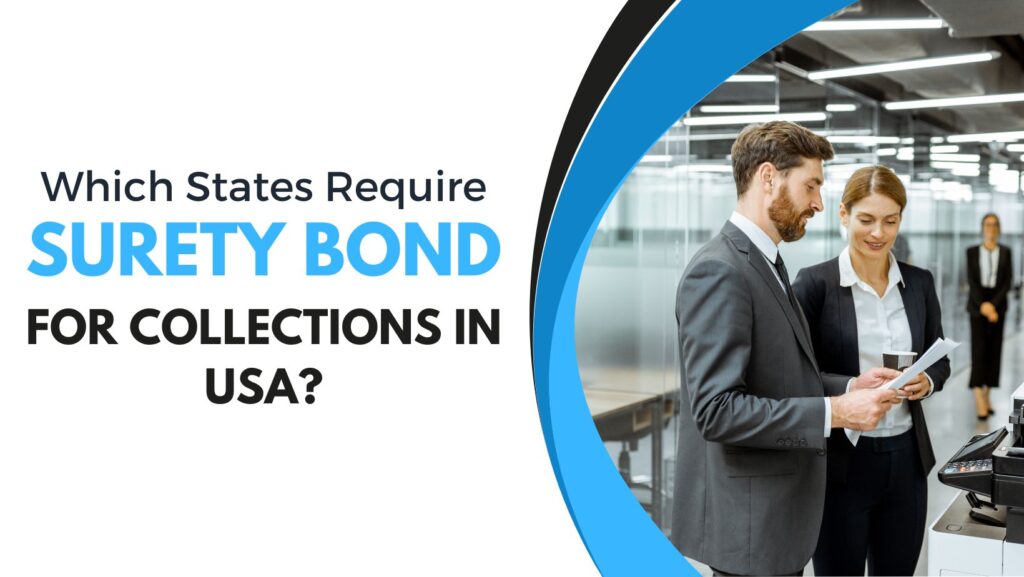The collection agency industry is highly regulated, and each state in the United States has its own rules and regulations when it comes to surety bond requirements. Knowing which states require collection agencies to obtain a surety bond can be tricky for those unfamiliar with the law. To help keep you on top of your game, this guide provides an overview of Collection Agency Surety Bond requirements around the US.

What Are Collection Agency Bonds?
Collection Agency Bonds (also known as Commercial Collection Agency Bonds) are a type of surety bond that is required by most state and local governments. These bonds provide protection to consumers from unethical collection agency practices, such as harassment or failure to abide by the terms of their contract with the customer. The purpose of these bonds is to ensure that collection agencies follow the applicable laws and regulations while also providing compensation to any individual or business that suffers a financial loss due to the actions of the collection agency.
Which States Require Surety Bond For Collections In USA?
Each state in the United States has its own laws and regulations regarding debt collection. In many cases, states require a surety bond for all debt collectors who are operating within their borders. Depending on the state, the amount of surety bond required will vary, but it is typically somewhere in the range of $5,000 to $25,000.
The states that require surety bonds for debt collection are Alabama, Arizona, Arkansas, Colorado, Connecticut, Delaware, Florida, Georgia, Idaho, Illinois, Indiana, Iowa Kansas Kentucky Louisiana Maine Maryland Michigan Minnesota Mississippi Missouri Montana Nebraska Nevada New Hampshire New Jersey New Mexico New York North Carolina Ohio Oklahoma Oregon Pennsylvania Rhode Island South Dakota Tennessee Texas Utah Virginia Washington Wisconsin Wyoming.
In some cases, a debt collector may be required to provide additional proof of surety bonding in order to keep their license active. For example, a debt collector who has failed to pay taxes or other debts may need to post an additional bond over and above the initial requirement. It is important for any debt collectors who are operating in these states to stay up-to-date with their surety bond requirements.
Additionally, some states may offer a limited license or permit for debt collectors without requiring a surety bond. However, the liability associated with such licenses is typically much higher than what is offered by the surety bond option. As a result, it is usually recommended that debt collectors obtain the surety bond in order to protect themselves from potential financial liability.
Do You Need A Collection Agency or Debt Collector Surety Bond?
If you are a collection agency or debt collector, it is likely that you will need to purchase a surety bond. Collection agencies and debt collectors are required by most states to be licensed in order to conduct business within their respective jurisdictions. As part of the licensing process, collection agencies and debt collectors must often provide proof of financial stability, which is often in the form of a surety bond.
What Will A Collection Agency Bond Cost?
The cost of a collection agency bond is based on your unique financial history and credit score. Generally, the higher your credit score, the lower the cost of your collection agency bond. Additionally, other factors such as the size of the surety bond needed and any existing claims against you can also affect the overall cost.
How Do Collection Agencies Become Licensed And Bonded?
In order to become a licensed and bonded collection agency, there are certain steps that must be taken in most states. These may vary slightly depending on the jurisdiction.
Generally, the first step is to apply for the appropriate licenses with the state government. This can include registering with the Department of Insurance or other relevant agencies.
The next step typically involves obtaining a surety bond, which is designed to protect consumers from any potential misconduct on the part of the collection agency. Additionally, it is also necessary for agencies to develop and implement policies and procedures to ensure compliance with state laws, as well as submit financial statements in order to prove that they have adequate resources available for payment of claims.
Finally, it is important to adhere to all applicable laws and regulations in order to maintain a valid license.
Will My Collection Agency Bond Work For Multiple States?
The answer to this question depends on the type of bond you have purchased. If you have a single-state bond, it will usually only be valid in the state for which it was issued. However, if you have a multi-state collection agency bond, it may offer coverage in more than one state. It is important to check with your surety company to be sure that your bond provides coverage in multiple states.
